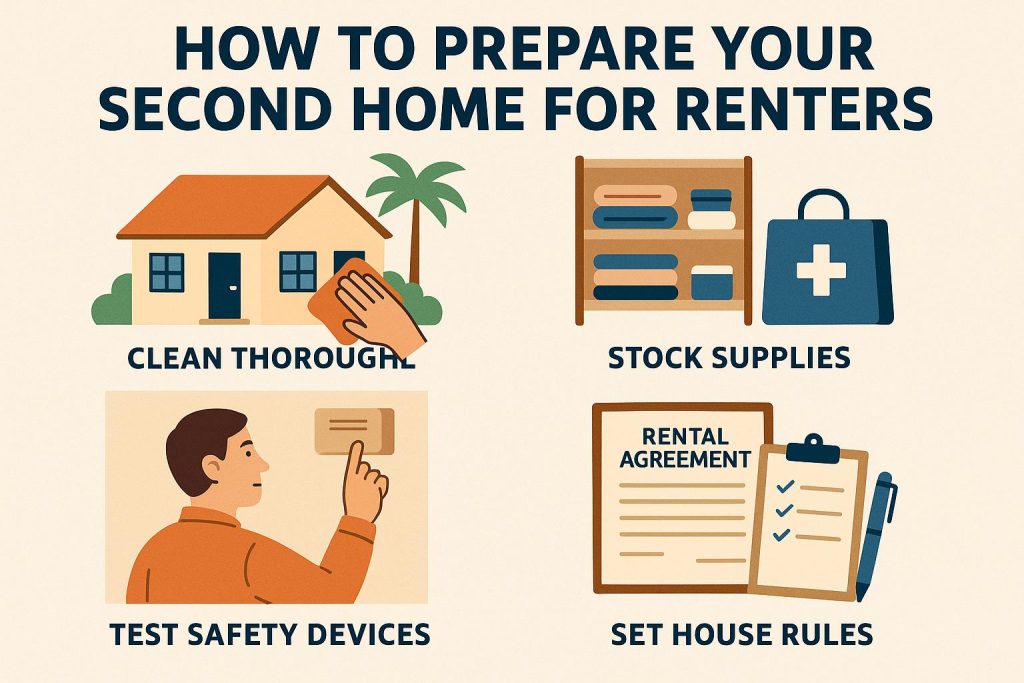How to prepare your second home for renters

Understanding Local Regulations
Before preparing your second home for renters, it is essential to understand the local regulations that might affect rental properties. Knowledge of local regulations starts with conducting thorough research on zoning laws, rental licenses, and any permits required in your area. These regulations vary greatly depending on location, but they typically determine how properties can be used and what legal obligations property owners must fulfill.
Zoning laws essentially dictate whether your property can be used as a rental. Some zones are strictly residential, while others might allow for temporary or long-term renting. Checking the zoning law details is crucial, as renting in a disallowed zone could result in fines or legal action against you.
Next, you must determine whether you need a rental license. Many localities require a rental license before you can legally rent out your property. This license sometimes demands inspections to ensure compliance with safety and health codes. Obtaining this license helps reassure that your property upholds local standards.
Lastly, become familiar with other permits or requirements like safety measures or signage. Each area might have unique provisions, so awareness is imperative. Adhering to these regulations not only helps avoid legal issues but also ensures compliance with housing laws.
Insurance Considerations
Having the right insurance coverage for your rental property is crucial. Standard homeowner insurance may not cover risks associated with renting out your property. As you transition your home into a rental property, it is wise to consider obtaining landlord insurance.
Landlord insurance is designed to protect property owners from specific risks related to renting. This insurance typically covers property damage due to natural disasters or intentional harm by tenants. Liability coverage, which protects against legal or medical costs if anyone is injured on the property, is another critical component. Furthermore, landlord insurance often includes loss of rental income if the property becomes uninhabitable due to covered damages.
Consultation with an insurance expert can help tailor the coverage to your needs, ensuring comprehensive protection. The goal is to safeguard your investment against unforeseen challenges that could otherwise lead to financial strain.
Prepare the Property
Ensuring your second home is in excellent condition is vital for attracting renters and maintaining a good reputation. Before listing the property, it is necessary to perform thorough inspections and carry out necessary repairs and updates to ensure the property is safe and appealing.
Clean and Declutter
A clean and clutter-free home is more attractive to potential renters. Start by conducting a deep clean of the entire property. This should include vacuuming carpets, mopping and polishing flooring, and washing windows until they sparkle. Removing personal items and unnecessary clutter is crucial to creating a neutral space that allows renters to envision themselves living there.
Maintaining a clutter-free environment not only appeals to potential renters but also simplifies property management and maintenance, creating a win-win situation for both landlords and tenants.
Furnish Wisely
If you plan to offer your property as a furnished rental, it is essential to consider both durability and functionality when selecting furniture. Focus on choosing items that can withstand wear and tear while still providing comfort to the renters.
Minimalist and neutral designs tend to appeal to a broader range of potential renters. This approach ensures that your furnishings accommodate various tastes and preferences, making the property more inviting to a diverse audience.
Safety and Security
Safety is a top priority when preparing your home for renters. Start by ensuring that all safety devices, including smoke detectors and carbon monoxide alarms, are functioning correctly. Regular checks and maintenance help guarantee that these systems operate efficiently when needed.
Consider enhancing security features by installing measures such as deadbolts on entrance doors, outdoor lighting to enhance visibility, and a comprehensive security system for peace of mind. These installations not only protect your property but ensure tenant safety, which can be a decisive factor for renters.
Marketing the Property
Effective marketing is crucial for attracting renters to your property. To present your home in the best light, begin by taking high-quality photos that showcase its best features. Crafting a detailed, honest description of the home and its amenities is equally important. Highlight unique aspects, such as proximity to public transport or local attractions, to add tangible value to your listing.
Besides listing on popular rental websites, consider leveraging network potential through social media platforms. These efforts increase visibility, helping you reach a wider audience and attracting qualified renters who can appreciate what your property offers.
Screen Potential Tenants
Screening tenants is essential to ensure a smooth renting experience. Begin by conducting comprehensive background and credit checks to assess the suitability and reliability of potential renters. Consistently applying these checks reduces the risk of property damage or lost rental income due to unreliable tenants.
Additionally, verify employment status and request references from previous landlords. These steps provide insights into the potential tenant’s rental history, offering a glimpse into their behavior and practices as renters.
Establishing Rental Terms
Clearly defining and communicating the rental terms before entering into an agreement is a crucial step. Draft a lease that outlines policies related to rent payment, maintenance responsibilities, and any restrictions on property use. Make sure both you and the tenant thoroughly understand all terms and expectations to avoid disputes later on.
Clarity in these documents fosters trust and transparency, forming the foundation for a mutually beneficial rental relationship.
Regular Maintenance and Upkeep
Ongoing maintenance is indispensable for keeping your property in excellent condition and ensuring tenant satisfaction. Regular inspections and prompt addressing of repair requests are essential.
By conducting routine maintenance, you can prevent significant issues from arising, thereby preserving the property’s value and ensuring a safe, pleasant living experience for tenants.
Implementing these practices results in a better-maintained property and fosters good relationships with your tenants, enhancing retention rates and creating a cycle of satisfaction and reliability.
